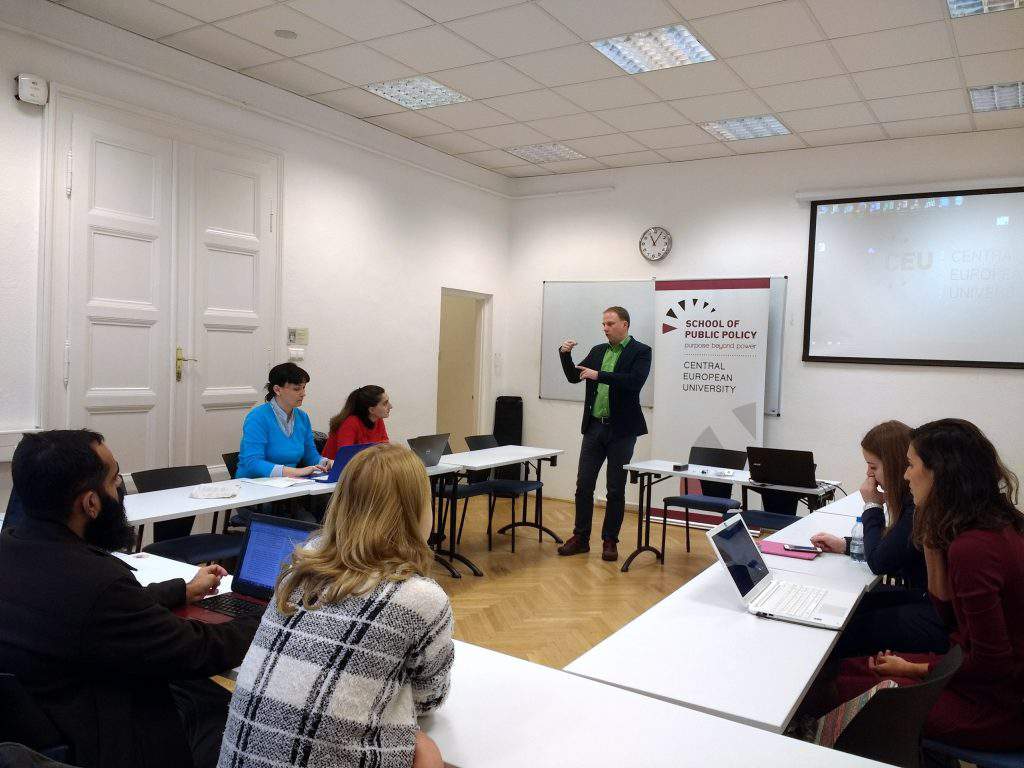INTERVIEW – Martin Kahanec: ‘Build a Better World – Study Public Policy’

The School of Public Policy at Central European University is a global institution committed to creating a community of purpose beyond power through multi-disciplinary study of public policy, innovative teaching and research, as well as meaningful engagement with policy practice. We had the opportunity to talk with the current Acting Head of the institution, Martin Kahanec, who answered our questions about his recent research as well as the graduate programs and scholarships his Budapest-based school has to offer.
You yourself are an alumnus of Central European University. What are some of your memories from your studies there?
Frankly, only the best. CEU is a life-changing experience. It is a vibrant intellectual hub, with many inspiring events every day, a diverse international community of students, faculty and staff, and some of the best Masters’ and PhD programs in Europe and the world. In Politics and International Studies, to which the School of Public Policy contributes, CEU ranks 42nd in the world according to the latest Quacquarelli Symonds (QS) subject ranking. My CEU experience was enabling and empowering at the same time; it was a key stepping stone for my career. But I also have great memories with my CEU fellow students: cool parties, memorable skiing trips, and lasting friendships.
What would you say the advantage of studying public policy is?
Equipping and empowering yourself with the tools and a vision to build a better, more just world. The world as we know it does not stand on the backs of four elephants, themselves resting on the back of a gigantic turtle. Rather, our civilization stands on great ideas of inspired, brave men and women. Some of whom you may meet at CEU’s School of Public Policy ☺.
Is studying public policy at CEU’s School of Public Policy any different than doing so at other leading public policy schools?
SPP is a school with a mission. We embrace the values of open society and self-reflective critical thinking. We are a global institution with a diverse student body representing 50 countries from all over the world who exchange their experiences and ideas in and out of the classroom. This diversity is fundamental in addressing any public policy challenges and advocating for policy change effectively. Students find a unique combination of conceptual and practical courses and applied policy projects at SPP, enabling an acquisition of core competences and skills for impact. Our main goal is to further expand and enrich our students’ experiences by engaging them with concrete policy challenges.
What academic programs are available at SPP and who can apply?
We offer three Master’s programs. Our two-year Master of Public Administration (MPA) program emphasizes the work-based and applied skills of policy management, leadership and advocacy. We expect our incoming students to have a wide variety of academic backgrounds, such as economics, environmental affairs, foreign languages, biological sciences, sociology, religion, history, business, maths, medicine, and engineering for this program.
In our one-year MA in Public Policy (MAPP) the emphasis is on the link between policy practice and analysis. This program includes a focus on research skills and exposure to real world policy challenges. It is also open to graduates of all disciplines, but degrees in the social sciences will score higher in the admission process.
Third, we offer a unique joint-degree program which is funded by the European Union; it is called Erasmus Mundus Master’s Program in Public Policy (Mundus MAPP). This program has strong analytical and practical components. Students spend the second year of their studies either at the Institut Barcelona d’Estudis Internacionals (Spain) or the University of York (UK).
Last but not least, we boast a PhD program in Political Science within the Public Policy Track of CEU’s Doctoral School of Political Science, Public Policy and International Relations. For our doctoral program we look forward to applications from those who have an interest in conducting academic research on the causes, functions, nature and outcomes of public policy.
 What are the most common careers of an SPP graduate?
What are the most common careers of an SPP graduate?
One third of our alumni join non-profit organizations and more than 25% of them pursue careers in the private sector. Most SPP graduates choose to work in areas of international development, human rights advocacy and human rights protection. Our alumni serve as national development strategy advisors, monitoring and evaluation specialists, gender advisors, or partnership managers, just to name a few. Many land at leading international institutions and multilateral organizations such as the World Bank, national governments, prominent think-tanks, or supra-national bodies such as the European Commission.
Do you offer scholarships?
A wide range of scholarships, fellowships, and loan options are available for those who apply to the School of Public Policy. On top of a number of full and partial tuition waivers, we award financial aid packages which not only cover the full cost of tuition but include a monthly living stipend, health insurance, and some of them even offer housing. Those who submit their application by February 1, 2018 and receive an acceptance offer, or are placed on the waiting list will have the opportunity to apply for financial aid, which is awarded based on a combination of academic merit and financial need. The majority of our students end up with some, often rather generous financial support.
[button link=”https://dailynewshungary.com/tag/ceu/” type=”big” color=”purple” newwindow=”yes”] Read more about CENTRAL EUROPEAN UNIVERSITY[/button]
Besides being the Acting Head and a professor of Central European University’s School of Public Policy, you are a leading expert on migration. What can you tell us in connection with the current European migration crisis?
The European migration crisis has reminded us how serious and severe the consequences of Europe’s ineffective migration framework may be. We have to manage Europe’s migration more effectively and selectively, pay more attention to immigrant integration, and fight discrimination of immigrants. We urgently need a robust migration framework capable of coping with steady as well as abrupt, large-scale waves of refugees and asylum seekers wanting to enter the EU. Citizens often oppose immigration mainly in consequence of a sluggish integration of immigrants and the tensions in perceived or actual differences in values between immigrants and natives. We therefore need a sustainable migration framework fostering the many benefits of immigration, congruent with citizens’ preferences, and adhering to human rights. The European migration crisis is an opportunity to address this challenge determinedly.
Source: Study in Hungary (website: www.studyinhungary.eu, email: info@studyinhungary.eu)









